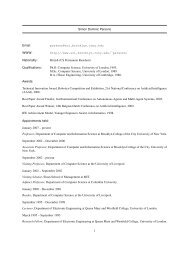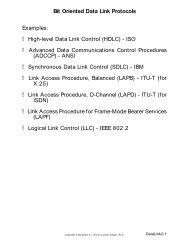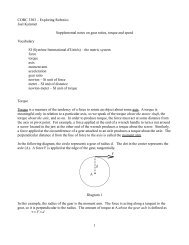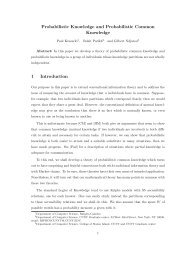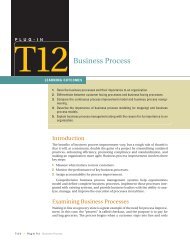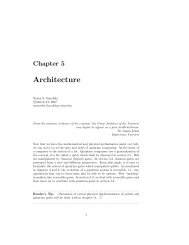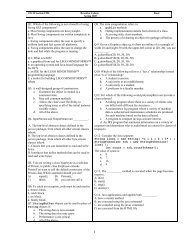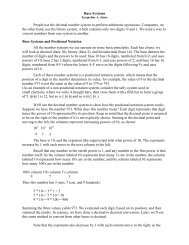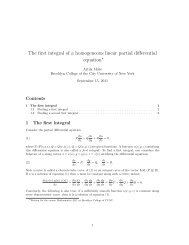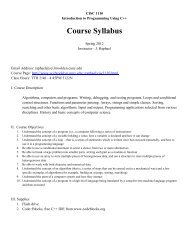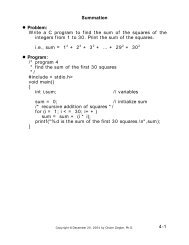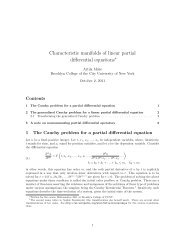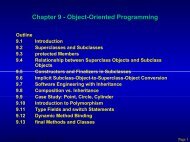*302 Greig and Others v Insole and Others 1977 G. No. 22461977 J ...
*302 Greig and Others v Insole and Others 1977 G. No. 22461977 J ...
*302 Greig and Others v Insole and Others 1977 G. No. 22461977 J ...
You also want an ePaper? Increase the reach of your titles
YUMPU automatically turns print PDFs into web optimized ePapers that Google loves.
[1978] 1 W.L.R. 302 Page 46<br />
[1978] 1 W.L.R. 302 [1978] 3 All E.R. 449 (1978) 122 S.J. 162 [1978] 1 W.L.R. 302 [1978] 3 All E.R. 449 (1978)<br />
122 S.J. 162<br />
(Cite as: [1978] 1 W.L.R. 302)<br />
fact imposed, it would clearly have been more easy<br />
to justify. In general terms I see the force of the<br />
proposition that official Test-players should not for<br />
the future be permitted to make themselves available<br />
to official Test cricket <strong>and</strong> to privately promoted<br />
international cricket in turn <strong>and</strong> from time to<br />
time, as <strong>and</strong> when they please. There would, I<br />
think, have been much to be said for the reasonableness<br />
<strong>and</strong> thus for the validity of a resolution<br />
passed on July 26, <strong>1977</strong>, of which the effect had<br />
been merely to inform cricketers in clear terms that<br />
any of them who thereafter contracted with <strong>and</strong><br />
elected to play cricket for a private promoter, such<br />
as World Series Cricket, could not subsequently expect<br />
to be engaged to play in official Test Matches<br />
by any of the cricketing authorities of the Testplaying<br />
countries.<br />
Despite the representations of the West Indies,<br />
however, this was not the form of the resolution<br />
which the ICC chose to adopt on July 26. The resolutions<br />
which, in fact, have to be justified are ones<br />
which applied indiscriminately both to those who<br />
had contracted with World Series Cricket before July<br />
26 <strong>and</strong> those who might thereafter contract with<br />
it. When the position is carefully analysed, I find it<br />
impossible to see how resolutions in this extended<br />
<strong>and</strong> wider form can be adequately justified on any<br />
rational <strong>and</strong> objective grounds.*353<br />
As a matter of fact, according to my findings, one<br />
principal reason why the resolutions took this extended<br />
form was because the ICC hoped that this<br />
would induce players to withdraw from their contracts<br />
with World Series Cricket. I have, however,<br />
already held that such attempted inducement constituted<br />
a tort as against that company. This cannot<br />
therefore, in my judgment, <strong>and</strong> indeed is not, urged<br />
as a justification for the resolutions taking the extended<br />
form which they took. Another consideration<br />
which, on the evidence, I do not doubt influenced<br />
the minds of a number of those representatives<br />
who were parties to the resolutions was that<br />
they thought that the players who had contracted<br />
with World Series Cricket deserved the ban. I have,<br />
however, already expressed the view that such<br />
players had committed no wrong of which the law<br />
can take account <strong>and</strong>, in any event, this again was<br />
not a consideration relied on in argument. I have<br />
also no doubt on the evidence that a perhaps underst<strong>and</strong>able<br />
desire generally to make things as difficult<br />
as possible for Mr. Packer actuated the minds<br />
of a number of the representatives at the ICC meeting<br />
on July 26. Once again, however, this is not a<br />
factor on which the defendants are entitled to rely<br />
or have relied in argument in the present context.<br />
Faced with this dilemma, Mr. Kempster<br />
sought to justify the imposition of the ICC ban on<br />
this extended, retrospective basis on what, I think,<br />
were logically the only substantially arguable<br />
grounds. He submitted that the imposition of the<br />
ban alike both on players who had contracted <strong>and</strong><br />
might contract thereafter with World Series Cricket<br />
was necessary in order to provide the essential effective<br />
deterrent against further recruitment to<br />
World Series Cricket. He reminded me of the evidence<br />
of a number of his witnesses in the context.<br />
Mr. Hadlee, for example, under cross-examination<br />
said that the purpose of applying the ban to those<br />
who had already signed was both to penalise them<br />
<strong>and</strong> afford an example to those who might consider<br />
signing in the future. Mr. Chidambaram, under<br />
cross-examination, said that a ban on persons who<br />
might in future sign for World Series Cricket would<br />
be “better <strong>and</strong> more forceful” as a deterrent, if it included<br />
persons who had already signed. Mr. Short,<br />
making much the same point, said, under crossexamination,<br />
that if the ban had been applied<br />
merely to those who might sign in the future <strong>and</strong><br />
had not been extended retroactively to persons who<br />
had already signed, this would not have been equitable<br />
in that “those who had signed too quickly, as it<br />
were, would get off scot-free.” Likewise, Mr Bailey<br />
said under cross-examination:<br />
“I think that the problem here was that retroactive<br />
action was felt to be the only possible course, for<br />
the reason that those who had already signed would<br />
otherwise have been in a more advantageous posi-<br />
© 2011 Thomson Reuters.



